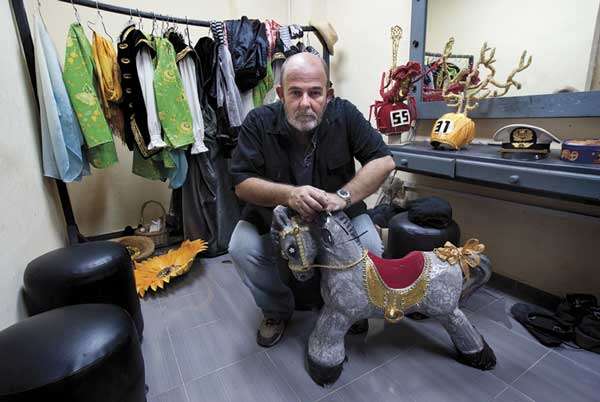Photos: Alain L. Gutiérrez / Abel Carmenate
Carlos Díaz is a wonderful man. His company is more of a family than a theater group. A family that is scandalous and spectacular, and none the less noble for it. His house is like a temple where everybody comes to make their confessions to him about how their lives are going. Federico, “Fico,” his dog, makes sure that nobody takes him away. I always got the impression that Fico was an expression, in his own way, of having the same need for Carlos as most people who know him. I have never figured out how Carlos is able to organize his time to make space for every single one of his friends. And, in fact, quite a lot of people love Carlos.
“It’s not that I live in the theater, but I love my profession and it would be very difficult for me to work with people who didn’t love it intensely. For me to feel comfortable, I need to care about and understand each one of my actors. I’m happy that I work with people who I love and who love me very much, because theater is something you have to do with love, and it’s very hard to do that if you don’t feel admiration, respect and a lot of affection for the people around you.”
“After we staged the U.S. trilogy The Glass Menagerie, Tea and Sympathy and A Streetcar Named Desire in the 1990s, we wanted to organize a family that was stable, a working group where we could do theater and be happy.”
And why “El Público” as a name?
“We gave our group that name because for us, the public (el público) that comes to the theater was, and should continue to be, very important. Federico García Lorca wrote a play with that name. There is a sentence in that play that sums up, to a certain extent, our concept of theater: There is the public. Let them come in! Because theater is made to be shown, because an empty theater is like the worst tragedy for an artist. It is only when you are able to achieve a language with the spectators that you feel like you are truly making theater.”
Carlos, your plays seem to fear nothing and nobody. People tend to talk about the nudes you use, but I think that when one of your actors undresses onstage, he or she is also undressing other things.
“There is nothing to say about the nudes. I think it needs to be done because there are too many taboos about the body. Some critics ask me every time I’m going to premiere a play whether or not I’m going to use nudes, and whether or not they are justified. But in everyday life, nobody asks people why they take off their clothes at a given moment. That is why my characters may be very dressed up or completely nude. Like in life itself.”
“In Cuba, we don’t have winter. There is a lot of heat in our culture, which is why I think that we sometimes have to undress, remove the masks to relieve prejudices.”
You have never stopped doing theater in Cuba. Your productions have traveled the world and you always come back. Why?
“There are seeds that don’t germinate in other lands, and that is my case. I’ve always thought that what I do here I could have done anywhere else, but that was not what I chose. Thanks to what I’ve achieved artistically with my work, I’ve been able to work without any contamination, without having to think about how to say things. That cultural fact in and of itself has made it easier to create a language with different types of publics, and that gives me a lot of strength.”
“To inundate a public that is not yours with emotion depends on a change that you should experience in an individual way, one to which I never wanted to subject myself. I respect, and have always respected, each person’s decision, but mine has been to keep working on this island.”
“Many actors and actresses from my group have left. My arm hurts from waving so many good-byes, but I respect them like I do the swallows that want to move on to other places, because for me the happiness of a man depends on where he wants to be, live and work. As Virgilio Piñera said, the world moves and moves quickly, and people have the right to move with it.”
Carlos Díaz and his theater company, Teatro El Público, will travel to the United States to present Calígula, a play that premiered in Cuba in 1995. Shows are set for June 14, 15, 16 and 17 at Miami’s Colony Theater. They were invited by Ever Chávez, president of FUNDARTE, who also worked with Carlos as a producer for El Público in the 1990s.






.jpg)


